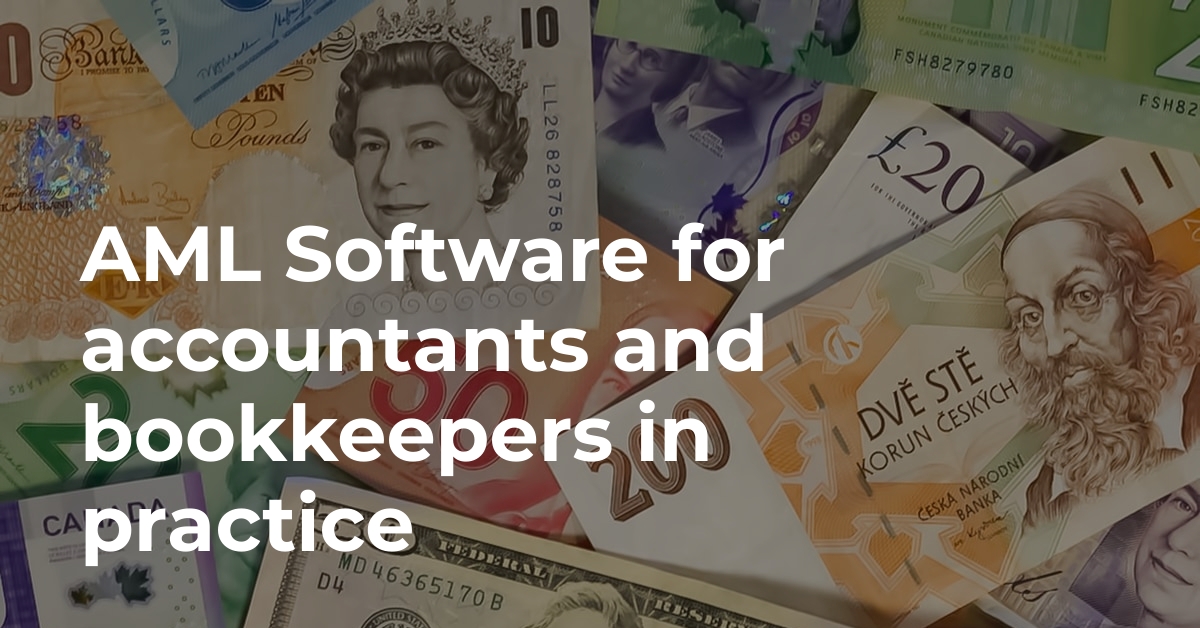AML software for accountants and bookkeepers in practice

If you’re an accountant or bookkeeper providing services to clients, it’s your legal obligation to keep anti-money laundering (AML) records. As per the changes in anti-money laundering directives in recent years, the rules are stringent. You should review your AML procedures in order to remain compliant. Non-compliance could lead to serious penalties, ranging from fines to imprisonment.
Before discussing the benefit of AML software for accountants and bookkeepers, let start with understanding what anti-money laundering is.
What is anti-money laundering?
Anti-money laundering is an attempt, or an effort, to identify and prevent the flow of funds obtained through illegal activities. It includes a set of policies, rules and legislation for organisations in order to adopt adequate measures to identify, control and report financial crimes.
What is anti-money laundering software?
Anti-money laundering software is time-saving, hassle-free technology, designed especially for accountants and bookkeepers, providing a wide range of tools for monitoring the risk and reporting of suspicious activity. With the use of AML software, it is easier to create, store and manage records through a wide range of features including:
- Electronic verification of clients
- Residency checks
- Risk assessments
- Appropriate analysing of risk factors – Politically exposed persons
- Continuous monitoring of client profiles
- Automatic detection of non-compliant clients
- Tracking of staff training
- Check on know your customer(KYC) information – client risk and documentation
- Importing of client records from any existing database
- Searching and downloading treasury sanctions list
- Alert suppression
- Automatic cross-checking against sanction datasets and politically exposed persons (PEPs)
- Real-time saving,which can be retrieved on-demand for regulatory visits and to support audits
AML software is hugely important in the market for accountancy firms, from large and multi-office organisations to sole practitioners, due to the variety of benefits the technology offers to combat the risk of money laundering.
Benefits of AML software
AML software offers a wide range of benefits to accountants and bookkeepers:
Automated KYC process
Knowing your customer is the first and most important step you need to take towards AML compliance. With an automated KYC process, accountants and bookkeepers can automatically identify their customers’ identity and examine their financial records before entering into another transaction with the customer. The facility of automated cross-checking against PEP and sanction-warning alerts makes accountants and bookkeepers aware of any suspicious activity, and a decision as to the accountant’s or bookkeeper’s next step can be taken early.
Making you compliant
AML software ensures quick and easy detection of non-compliance activity by keeping a check on the client’s records and allowing staff to issue a suspicious activity report. Many AML software offerings connect you to Companies House, enabling you to confirm the name and address of the company/individual you are working – or want to work – with.
Training and education
AML software provides a comprehensive training programme through various training modules, to give extensive knowledge about AML compliance to your whole team. It can track when staff training is completed, including the access of AML compliance technical reference manuals. It helps in reducing the need for paper audit trails and ensures that the whole team is well-trained on the adequate measures taken to combat money laundering and fully up to date on the legislation as well as requirements.
Conducting due diligence
Due diligence is enhanced by AML software; it can ensure identification, verification and continuous monitoring of all your clients and help you remain compliant.
Risk assessment
AML software helps accountants and bookkeepers carry out a risk assessment thattakes into account all the risk factors relating to your clients. The assessmentchecks can also be provided to regulatory bodies upon request.
Lower operational cost
There is a need for accountants and bookkeepers to adopt adequate measures to remain compliant with AML. Manual processes are resource-intensive and carry their own risks – particularly around human error. AML software enables you to reduce the high operational costs of compliance and better manage risk.
Time saving
There are various measures you need to adopt to combat money laundering but AML software allows you to automate processes, freeing time to focus on other important business tasks.
We hope that this blog helps you better understand how AML software can play an important part in the life of an accountant or bookkeeper in practice, making it easier to combat money laundering – and keeping you compliant.
Want to find out more?
Book a free 30-day trial or talk to one of our advisor and see how our accounting software can help you manage staff, increase profitability and take your practice to the next level.

Can You Amend a Submitted CT600 Form with HMRC?
If you have submitted a CT600 Corporation Tax return and later find an error or...
Read More

What Is Remittance Advice? Definition, Importance & Examples
A remittance advice is a simple document sent by a customer to a supplier, letting...
Read More

What Features Should You Look for in Corporation Tax Software?
If you are a small business owner or an accountant, navigating the difficulty of corporation...
Read More

Final Accounts Filing Deadlines in the UK
If you run a business in the UK, you’ve heard about filing final accounts, but...
Read More